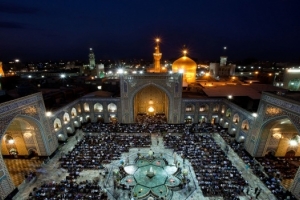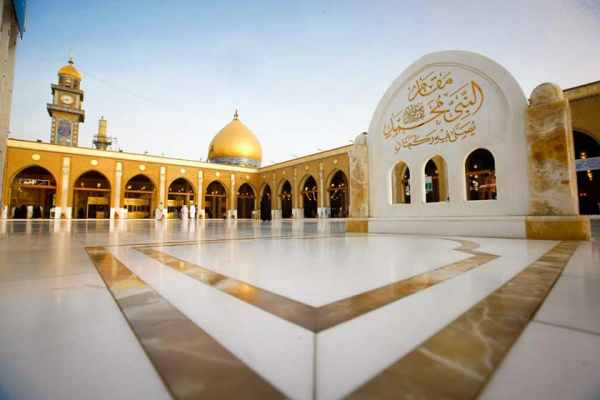Birth anniversary of Imam Reza (AS)
Today all eyes and hearts are turned toward Khorasan in northeastern Iran, towards the city of Mashhad, which is without the least doubt, the holiest spot in the Islamic Republic. People are streaming there from all over the country and from various parts of the world on this special day, to salute a very special person. Yes, dear listeners, today is the 11th of the month of Zi’l-Qa’dah the blessed birth anniversary of the peerless person who reposes in peace in Mashhad. He is none other than the 8th Infallible Heir of Prophet Mohammad (blessings of God upon him and his progeny). He is Imam Reza (PuH), the guardian of this land, who was born this day in the Prophet’s city Medina. Stay with us for an exclusive feature on his life, his times, and his pivotal role in the salvation of the faithful.
“The Imam is a kind father, a helper brother, (could be likened to) a compassionate mother to a minor child, and a refuge for creatures of God in severe calamities.”
What we recited was not the statement of any theorist, since imamate or divinely-decreed authority, is not a theory or an ideology of the fallible minds. The Imamate or leadership of the pious, as is evident by ayah 124 of Surah al-Baqarah of the holy Qur’an is the exclusive trust of God reserved for the Chosen of God, and is not granted to the unjust:
“And when his Lord tested Abraham with certain words, and he fulfilled them, He said, ‘I am making you the Imam of mankind.’ Said he, ‘And from among my descendants?’ He said, ‘My pledge does not extend to the unjust.’”
It was God who made Prophet Abraham (PuH) an Imam of mankind, and told him in explicit words that this prestigious position will never be the prerogative of the perfidious. In other words, only the most virtuous and just from the progeny of Abraham will be conferred this authority of leadership of mankind. Thus, the Last and the Greatest Messenger of God, Prophet Mohammad (blessings of God upon him and his progeny), who was direct descendant of Abraham through his firstborn son, Ishmael, was rewarded by the Almighty with this position. But Imamate, in its exclusive sense, was reserved by God for a select group of the descendants of the Seal of Prophets, who were not prophets themselves. To be more precise, it was during the mission of the Prophet of Islam that Imamate reached its climax. It was the last year of the Prophet’s life, and while he was returning to Medina from Mecca after having performed his Farewell Hajj pilgrimage, Archangel Gabriel descended with an urgent revelation that had to be proclaimed immediately to the Muslims. The Prophet halted at the place called Ghadeer-Khom, and on revelation of ayah 67 of Surah al-Ma’edah, addressing the huge gathering of 120,000 people, entrusted Imamate, in the full limelight of history, to his cousin and son-in-law, Imam Ali ibn Abi Taleb (PuH). The Prophet later specified that the Imams of his Blessed Household the Ahl al-Bayt, will number 12, with the last of them reappearing in the end times, after a prolonged occultation, as Qa’em al-Mahdi (AS) to cleanse the Planet of all vestiges of corruption and oppression by establishing the global government of peace, prosperity and justice.
Today is the 11th of the sacred month of Ziu’l-Qa’dah, the day when the 8th Infallible Successor of the Prophet of Islam was born in Medina in 148 AH, a fortnight after the passing away of his illustrious grandfather, the Reviver of the Prophet’s genuine Shar’iah or code of jurisprudence, Imam Ja’far as-Sadeq (PuH). He was the son of Imam Musa al-Kazem (PuH), while his mother was the most virtuous lady of her era, named Najma. He was named Ali in honour of the One and Only Commander of the Faithful, Imam Ali ibn Abi Taleb (AS), the First Infallible Imam. His knowledge, like that of the Prophet and other infallible members of the Ahl al-Bayt, was God-given. He strode in the footsteps of his father and forefathers in enlightening the ummah in those critical days of the tyrannical rule of the usurper Abbasid regime. He earned the epithet of “Reza” or the one pleased with the Will of God Almighty, whatever the circumstances. At the age of 50, fifteen years after being conferred the Imamate by God, he was forced to leave his hometown Medina. He was brought to distant Khorasan in northeastern Iran, where the crafty self-styled caliph, Mamoun, had made the city of Marv, the capital of the Abbasid realm. After almost three years in Khorasan, where he demonstrated his qualities to guide the seekers of truth, Imam Reza (PuH), was martyred through a fatal dose of poison by Mamoun in the city of Tous, which is known today as Mashhad – or place of martyrdom. It is the most blessed spot in Iran. Today when people from all over Iran and from the farthest parts of the globe (of different ethnicities) are in Mashhad to partake of the blessings of the birthday of Imam Reza (AS) at his holy shrine, by supplicating in their own native tongues, it will not be out of context to refer to an incident that is proof of the universality of the mission of the Prophet of Islam and the Infallible Imams of his household.
When a person from India named Ismail as-Sindhi enquired about the Prophet’s rightful successor, he was guided to Imam Reza (PuH). He says: “Since I did not know Arabic, I greeted him in Sindhi language, and (to my surprise), he answered my greeting in my own language. I talked to him in my language and he talked back to me in my language. I told him: ‘I have come to see Allah’s authority.’ He answered: ‘It is me (who is Allah’s authority), ask whatever you like.’ I asked my questions and the Imam answered me in my own language. When I wanted to leave, I told him, ‘since I do not know Arabic, please beseech God to inspire me with the knowledge of Arabic language! He rubbed his blessed hand on my lips, and all of a sudden, I was able to speak Arabic!”
This miracle is not something to be surprise about regarding the Chosen of God. A similar incident occurred in Basra, Iraq during the 8th Imam’s journey to Khorasan. A certain Amr bin Haddab challenged Imam Reza (PuH) to prove his claim of knowing any language, by speaking in their own language with the Romans, the Hindus, the Persians, and the Turks who were in the town. “Call them in,” said the Imam and several speakers of various languages were brought to his presence. He talked to all of them in such fluency that all admitted to his mastery in their native tongues. The Arabs were astonished, since Imam Reza (PuH) had never had a teacher and had never learned any language with anyone, nor had he associated with such persons in Medina. The answer is simple. Imam Reza (PuH) was giving a practical demonstration of God’s Words in ayah 12 of Surah Yasin of the holy Qur’an:
“We have placed everything in the Manifest Imam.”
Among the plans of Mamoun in bringing Imam Reza (PuH) to his court in Khorasan was to try to undermine the position of Imamate in the hope that political position and proximity to the Abbasid court will discredit the Ahl al-Bayt in the eyes of the Muslim masses. He, however, failed, as Imam Reza (PuH) despite being declared heir-apparent against his will to the much younger caliph, refused to involve himself in political matters, especially the appointment or dismissal of officials. As the Prophet’s rightful heir, he made himself easily accessible to all persons, particularly the poor and downtrodden, without any court formalities, and this wise move increased his popularity. Mamoun was flabbergasted. He next ordered debates between the 8th Imam and the scholars from all over the world. He was hoping that maybe the scholars would be able to win the debates and defeat the Imam by posing scientific questions. On the caliph’s order, his prime minister, Fazl ibn Sahl, invited philosophers and learned men from all over the realm to debate with the Imam. These included Christian scholars, Jewish Rabbis, Priests of the Sabean religion that follow Prophet Yahya (PuH), prominent Zoroastrian mobads, and even atheists. Imam Reza (PuH) to invite him to that ceremony. The Imam accepted the challenge and remarked: Mamoun will rue his decision, when he sees me disproving the claims of the Jews from the Torah itself, and that of the Christians from the Evangel. The Imam thus debated one by one with the scholars of various religions, including Zoroastrians in Persian language, and the Romans in Latin and Greek. By the Grace of Almighty Allah, he convinced them of the truth of Islam, and to the surprise of Mamoun, most of these scholars recited the two-fold testimony of Islam and became Muslims.
We congratulate you once again on the blessed birth anniversary of Imam Reza (PuH), and present you some of his wise sayings that continue to guide Muslim till this day:
1. “He who compares and likens Allah to His creation is a polytheist and the one who attributes something which has been forbidden for HIM is an infidel.’
2. “Faith is to one grade superior and sublime to Islam; piety is one degree superior to faith; and certitude and certainty is one step superior to faith. Nothing more elegant and excellent than certitude has been bestowed upon the sons of Adam (AS).”
3. “Faith has four pillars: Trusting and relying upon Allah; Contentment and pleasure with the Divine Will; Submission to the ordinance of Allah; and turning over all affairs to Allah, which means resignation Divine Will.
4. “Faith means performing and discharging the obligatory duties and avoiding forbidden acts, since faith is the cognition of Allah through the heart, acknowledgement through the tongue and practicing through bodily organs.”


















